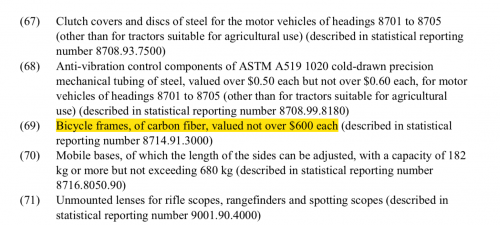WASHINGTON (BRAIN) — The U.S. Trade Representative has granted a tariff exclusion for China-made carbon fiber frames, an exclusion requested by Parlee Cycles, Inc. Importers of China-made carbon frames will no longer need to pay a 25% tariff; additionally, they can request reimbursement for the additional tariffs they've paid since the Trump administration imposed them last year. The exclusion expires Aug. 7, 2020, and applies only to frames that are imported separately, not as part of complete bicycles.
It is just the second product exclusion granted to the bike industry, which filed 94 requests by the time the USTR closed the filing window on Sept. 30. The other exclusion granted was for singlespeed road bikes, at the request of State Bicycle. There is hope that more exclusions will be granted, however, as only one request so far has been denied: that of Delta Cycle for bicycle storage racks.
"There is most definitely hope that additional exclusion requests will be granted, and we are optimistic that the successful applications so far bode well for the consideration of additional applications filed by our industry," said Alex Logemann, PeopleForBikes' policy counsel. "All other exclusion requests for bicycle products are still in Stage 2 of the process, which means they are undergoing their initial substantive review. It will be a very good sign if any of these requests advance to Stage 3, where they are reviewed for whether the exclusion can be administered by Customs and Border Protection."
Parlee, which is based in Beverly, Massachusetts, has also requested an exclusion for carbon forks. That request is in Stage 2. Parlee filed its request earlier than most: on Aug. 16. Most of the requests from the bike industry came in just before the Sept. 30 deadline. As of Oct. 29, one request has moved up to Stage 3: a request from CatEye America for an exclusion for its Velo 7 bike computer.
As with the singlespeed exclusion, the carbon frame exclusion is for a specific product type that is not called out in the Harmonized Tariff Schedule import codes. The frames excluded fall under HTS 8714.91.3000, which applies to frames of bicycles and other cycles valued not over $600 each — of any material.
Last year the U.S. imported nearly 500,000 frames, of all materials, under the code, for a total value of $32 million. Imports have declined significantly so far in 2019, with about 200,000 frames imported through August, valued at $21 million. There's no way of knowing how many of the imports are carbon.
Prior to last year the products were subject to a 3.9% tariff; that remains in place. The additional tariff started at 10% last September and increased to 25% in May. The administration had threatened to increase it to 30% on Oct. 1 and then on Oct. 15, but the increase has now been indefinitely postponed.
Trek Bicycle has requested exclusions for frames (of any material) valued at under $600 and over $600. The company's request said it used frames falling under both value ranges in its Project 1 custom bike program, where Trek paints imported frames at its Wisconsin factory. PeopleForBikes, on behalf of the industry, has filed an exclusion request for all frames valued under $600. All these requests are still in Stage 2.
In its request for exclusion, Parlee said, "(d)omestic manufacturing of these frames is cost prohibitive." The company also said it had hired a consultant to study the viability of third country factories but "the startup costs to move to a new manufacturer outside of China are prohibitive at this time." It said passing the costs of the tariffs on to the consumer "is not an option."
Parlee also said the frames' technology is not of strategic importance. "The basic technology used in this manufacturing process has been well established in China for decades. There is not a threat of China acquiring technology that it does not already posses " the company said.
The frames were part of the third tranche of tariffs, imposed Sept. 24, 2018, on about $200 billion in Chinese imports. According to one study, the USTR has granted nearly a quarter of all requests for exclusions from its new tariffs.


